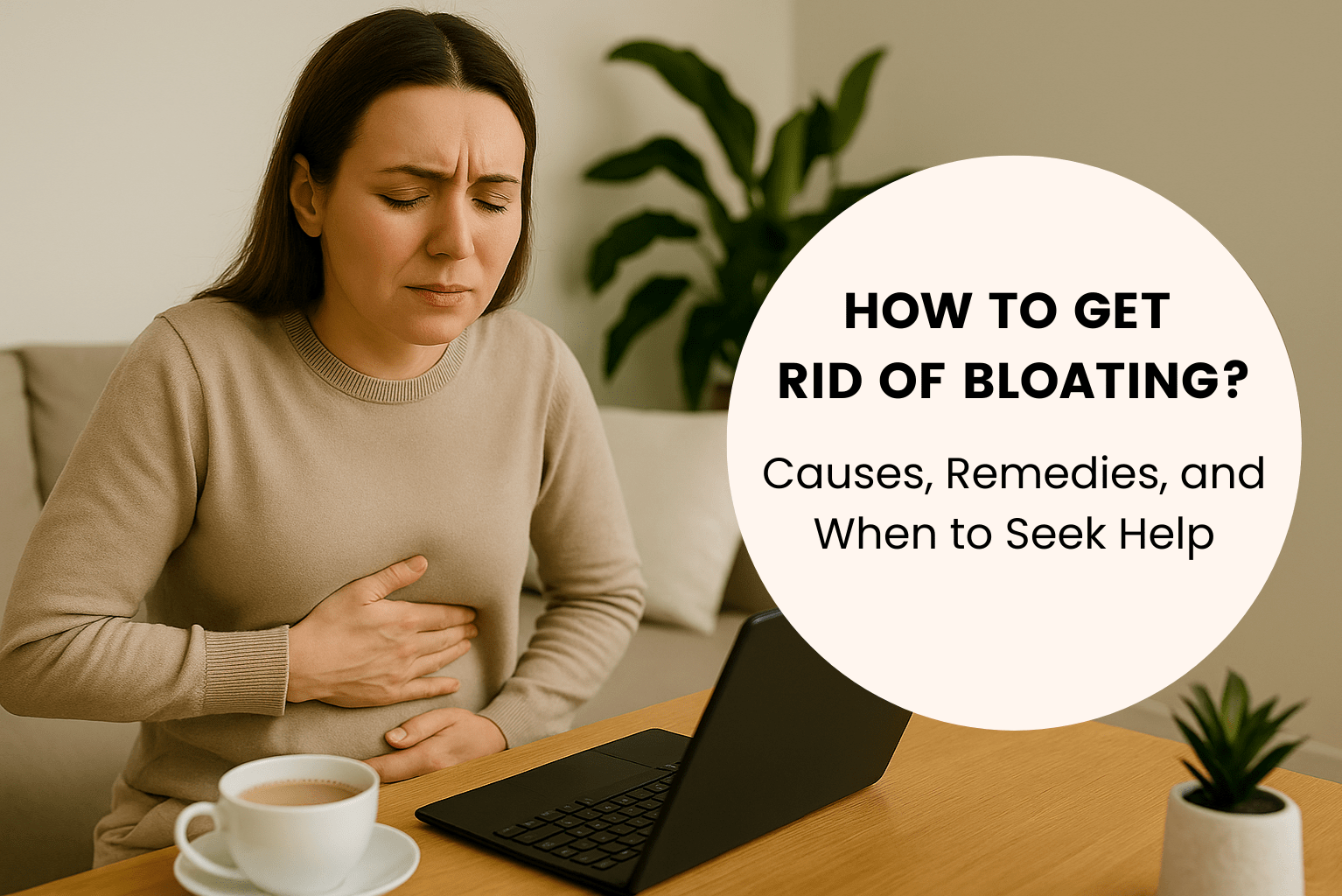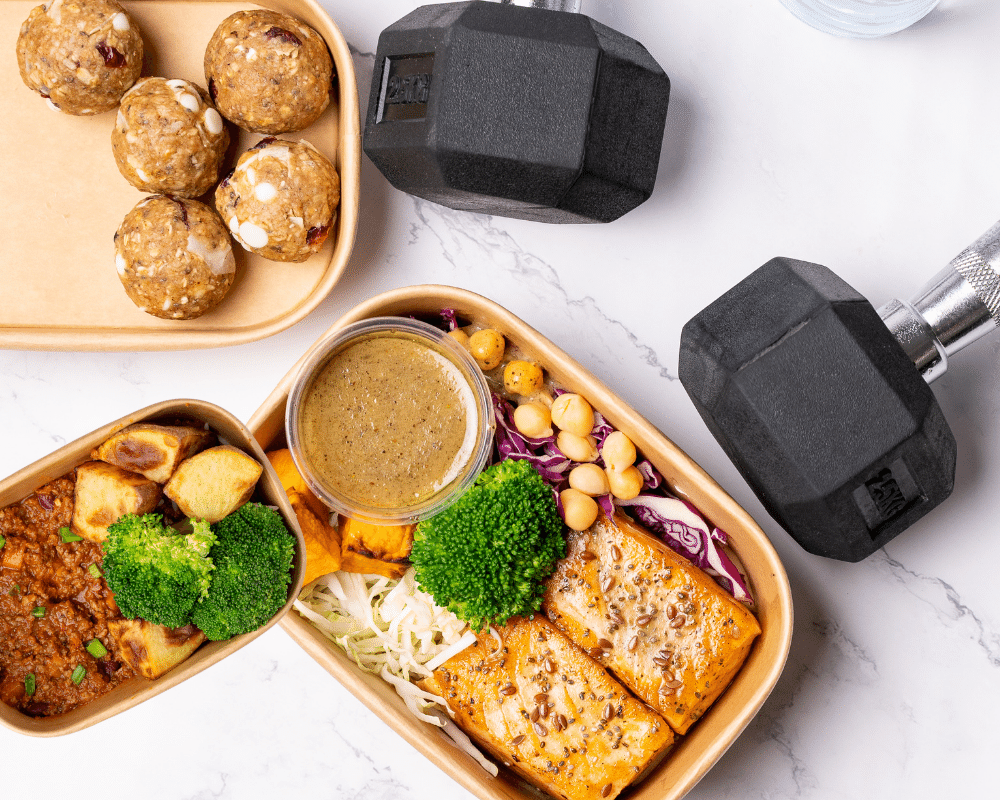How to Get Rid of Bloating: Causes, Remedies, and When to Seek Help?
Bloating is one of the most common, and frustrating, digestive issues out there. If you have ever felt uncomfortably full or noticed your stomach distending (swelling) after a meal, you are not alone. For many people, bloating is occasional and harmless, but when it becomes frequent or uncomfortable, it can interfere with daily life. The good news is that bloating can often be improved with simple changes to eating habits and lifestyle.

Author: Helen Conway
Nutritionist
What is Bloating?
-
Bloating is the sensation of abdominal fullness, pressure, or tightness, which is usually accompanied by a visibly distended or swollen stomach. It often results from a build-up of gas in the gastrointestinal tract or from disrupted coordination of the digestive muscles. In some cases, bloating can also occur due to the sheer volume of food or liquid in the stomach.
-
A small amount of bloating after eating can be completely normal. As food moves into the large intestine, gut bacteria ferment (break down) undigested fibres and carbohydrates from the food we eat, producing gas. This microbial fermentation is a normal part of the digestive process. It supports gut health, aids nutrient metabolism, and maintains a balanced intestinal environment (Mora et al., 2021; Farup et al., 2021).
-
For most people, this leads to minimal and short-lived bloating that should not cause discomfort. However, when bloating becomes excessive, persistent, or painful, it may indicate a more serious gut health disorder like abnormal gut motility, imbalances in the gut microbiome, dietary triggers, or conditions like irritable bowel syndrome (ZOE, 2023; The Gut Health Doctor, 2023; BDA, 2023).
Common causes of Bloating
Bloating often has a few key triggers and knowing them can help you get ahead of it.
- Eating too quickly or while distracted – Swallowing excess air during meals increases gas accumulation in the gut.
- Large meals or heavy portions – Overloading the stomach can slow gastric emptying and promote increased gas production.
- Rapid increases in fibre intake – While fibre is important, sudden increases can overwhelm the gut and lead to the production of excess gas.
- Highly processed foods – Certain food additives may disrupt the balance of gut bacteria, potentially worsening bloating (Mora et al., 2021).
- Hormonal changes – Hormonal fluctuations, particularly during the menstrual cycle, can alter digestive function and sensitivity.
- Gut sensitivity and IBS – People with gut sensitivities or IBS may experience bloating even with normal gas levels (Farup et al., 2021). If you have a diagnosed gut condition or suspect one, it’s always best to follow the guidance of your healthcare provider.

Quick Fixes for Bloating Relief
Evidence-based strategies to help manage bloating include:
Eat slowly and chew thoroughly – This reduces air swallowing and improves digestion. Aim for 10-20 chews per mouthful.
Manage portion sizes – Smaller, balanced meals spaced throughout the day can reduce digestive load.
Increase fibre gradually – Gradual changes allow the microbiota to adjust and minimise gas production.
Maintain a varied, balanced diet – Diverse plant fibres and whole foods support a resilient microbiome.
Stay physically active – Exercise promotes gut motility and can help reduce excess gas.
Try peppermint tea or capsules – Peppermint relaxes the gut muscles, which can ease cramping and help release trapped gas. Peppermint oil capsules typically offer a higher, more effective dose than tea for relieving bloating and IBS symptoms.
Watch your salt intake – High salt consumption can cause water retention, making bloating feel worse. Reducing salty processed foods may help ease this.
Try abdominal massage – Gentle self-massage in a clockwise motion can help stimulate digestion, encourage the movement of gas through the intestines, and relieve bloating discomfort.
Identify personal triggers – Keeping a food and symptom diary can help pinpoint specific foods or habits that contribute to bloating.

When to Seek Medical Advice?
Although mild bloating is often harmless, it is important to consult a healthcare professional if you experience bloating alongside unexplained weight loss, vomiting, gastrointestinal bleeding, or significant changes in bowel habits (BDA, 2023).
How FITT Meals Can Help?
FITT Meals offers balanced, portion-controlled meals with a focus on whole food and high-fibre ingredients to support digestive health. Our diverse menus help support a healthier, more resilient gut without the stress of meal planning.
Mora, M., D’Amato, M., & Rossi, M. (2019). Diet, gut microbiota and gastrointestinal symptoms in health and disease. Nutrients, 11(12), 2860. https://doi.org/10.3390/nu11122860
The Gut Health Doctor. (2023). Feeling bloated? Here’s what to do. Retrieved from https://www.theguthealthdoctor.com/feeling-bloated-heres-what-to-do
The Gut Health Doctor. (2023). Is tea good for you? Retrieved from https://www.theguthealthdoctor.com/is-tea-good-for-you
ZOE. (2023). Bloating: What causes it and how to manage it. Retrieved from https://zoe.com/learn/bloating
ZOE. (2023). Foods that help digestion: Top choices for a happy gut. Retrieved from https://zoe.com/learn/foods-that-help-digestion
British Dietetic Association (BDA). (2023). Bloating. Retrieved from https://www.bda.uk.com/resource/bloating.html
Farup, P.G., Tollefsen, A.M., & Valeur, J. (2016). Gas and bloating: Incidence, impact, and management. International Journal of General Medicine, 9, 403–411. https://doi.org/10.2147/IJGM.S112591





